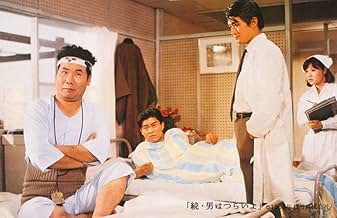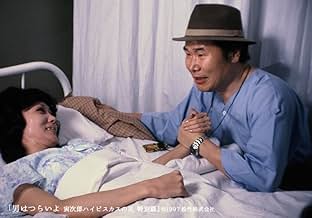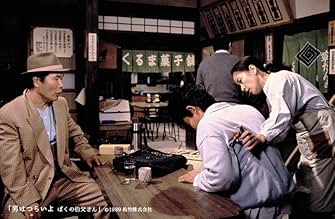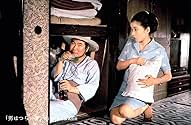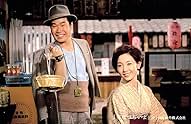Ajouter une intrigue dans votre langueTora-San, an itinerant peddler who is thrown out of his father's house twenty years before but reconnects with his aunt, uncle and sister Sakura. Tora wreaks some havoc in their lives, like ... Tout lireTora-San, an itinerant peddler who is thrown out of his father's house twenty years before but reconnects with his aunt, uncle and sister Sakura. Tora wreaks some havoc in their lives, like getting drunk and silly at a marriage meeting.Tora-San, an itinerant peddler who is thrown out of his father's house twenty years before but reconnects with his aunt, uncle and sister Sakura. Tora wreaks some havoc in their lives, like getting drunk and silly at a marriage meeting.
- Réalisation
- Scénario
- Casting principal
- Récompenses
- 3 victoires au total
Taisaku Akino
- Noboru Kawamata
- (as Masaaki Tsusaka)
Avis à la une
This first film in what is purported to be the longest run series in film history tells the tale of Tora-San, an itinerant peddler who is thrown out of his father's house twenty years before but reconnects with his aunt, uncle and sister Sakura (the very pretty and sweet Chieko Baisho). Tora wreaks some havoc in their lives, like getting drunk and silly at a marriage meeting and ruining Sakura's chance to marry someone, as well as just being a real pain to those around him. There is a sentimental side to him also, and the best way to describe him is that he grows on you. This film features smallish roles by two of the greatest actors in film history, Chishu Ryu as a priest and Takashi Shimura, as Sakura's prospective father in law. They light up the screen when they're in the film. Kind of a film about a bygone era in Japan, as itinerant peddlers are all but gone, this film reminds me somewhat of the two "Always Sunset On Third Street" films, as they are also about a bygone era. Crazy, funny & sentimental, this film delivers. I have not seen any of the rest (so far, anyway) of the films in this series, but I am intrigued. Atsumi Kiyoshi, who plays Tora, is good in this. I recommend it, its a very good film.
First "Tora-san" feature sets up format for the rest of the series, with Tora-san returning home to Shibamata after many years estranged from his family. Atsumi is hilarious, Baisho luminous, and Yamada's screenplay and direction is sensitive yet uncomprimising. As Kevin Thomas of the "LA Times" told me for an article I wrote on the series, these pictures are "sentimental, but in the good sense of the word." The real surprise here is the appearance of Takashi Shimura ("Seven Samurai," "Ikiru") as Hiroshi Suwa's estranged father. His scenes and how they relate to Tora-san's own life, is emotionally powerful stuff sprinkled with some very funny moments as well. It's really a shame that NONE of these movies are presently available on home video in the United States.
Where character of Tora-san came out is an interesting topic. The huge success of this series of course owes a lot to the great talent of actor Kiyoshi Atsumi, and director and screen writer Yoji Yamada, but something about this story must hit close to home in the minds of Japanese audience.
Tora-san is as imperfect as a human can get. Yet, he has no ill intentions to anyone he meets which makes him endearing to the audience. Also the culture of down town Tokyo is very special. Although people may not be rich or refined in modern ways, they genuinely care and look after each other, while holding to their tradition.
Perfection is obvious in the story and cinematography presented by director Yoji Yamada. In some ways he shot some of the most beautiful scenes of his career in this series.
This movie was conceived due to two events which precedes its creation. First was another movie starring Kiyoshi Atsumi called Haikei tenno heika sama (Dear His Majesty) which he made stellar performance in, and idea of using Atsumi in a similar role was conceived. The other was the TV drama version of this story where in the end Tora dies from a poison snake bite. The ending of this series was hugely unpopular with the audience, and this movie series was born with non-tragic ending for Tora-san in each episode. Initially the series was to conclude after five episodes, but due to its popularity, it continued for 48 episodes (Yoji Yamada's plan was to shoot 50 episodes, but it ended by Atsumi's untimely death).
By watching this series, you will understand the underpinning of Japanese culture better than any class in sociology can give. The brisk exchange between the characters, quick tempered brawls, who cares attitude, self pity, abandonment, sense of obligation which are all unique to the Japanese society. Although Japan now wears a facade of modernization, in its roots is the feeling like those of the people in this movie. It embodies the modern representation of what the Japanese call "Naniwa Bushi".
The movie is all star cast including Takashi Shimura, Chishu Ryu, future stars of J-drama like Daisaku Akino, and Gin Maeda. Stellar performance by Cheko Baisho as Sakura, and Sachiko Mitsumoto adds to the story.
The seminal episode of Tora-san movie is a delight to watch both from the story, and its beauty.
Tora-san is as imperfect as a human can get. Yet, he has no ill intentions to anyone he meets which makes him endearing to the audience. Also the culture of down town Tokyo is very special. Although people may not be rich or refined in modern ways, they genuinely care and look after each other, while holding to their tradition.
Perfection is obvious in the story and cinematography presented by director Yoji Yamada. In some ways he shot some of the most beautiful scenes of his career in this series.
This movie was conceived due to two events which precedes its creation. First was another movie starring Kiyoshi Atsumi called Haikei tenno heika sama (Dear His Majesty) which he made stellar performance in, and idea of using Atsumi in a similar role was conceived. The other was the TV drama version of this story where in the end Tora dies from a poison snake bite. The ending of this series was hugely unpopular with the audience, and this movie series was born with non-tragic ending for Tora-san in each episode. Initially the series was to conclude after five episodes, but due to its popularity, it continued for 48 episodes (Yoji Yamada's plan was to shoot 50 episodes, but it ended by Atsumi's untimely death).
By watching this series, you will understand the underpinning of Japanese culture better than any class in sociology can give. The brisk exchange between the characters, quick tempered brawls, who cares attitude, self pity, abandonment, sense of obligation which are all unique to the Japanese society. Although Japan now wears a facade of modernization, in its roots is the feeling like those of the people in this movie. It embodies the modern representation of what the Japanese call "Naniwa Bushi".
The movie is all star cast including Takashi Shimura, Chishu Ryu, future stars of J-drama like Daisaku Akino, and Gin Maeda. Stellar performance by Cheko Baisho as Sakura, and Sachiko Mitsumoto adds to the story.
The seminal episode of Tora-san movie is a delight to watch both from the story, and its beauty.
Besides being an itinerant salesman, Tora san also shows adeptness as a Palm-Reader. At those times he is shown promoting his Palmistry by prominently displaying a huge banner which depicts a diagram of the human palm with its designated lines.
Tora san's Palmistry is reflective of the acceptance with which Palm-reading is viewed by Japan and the Orient in general. Strolling down the Ginza nowadays, one can see an occasional Palm-Reader who has set up a table along the pedestrian walkways. Even more so in China where even their temples have a resident soothsayer. Not surprising when you consider that Palm-Reading is said to have originated in China.
Tora san's Palmistry is reflective of the acceptance with which Palm-reading is viewed by Japan and the Orient in general. Strolling down the Ginza nowadays, one can see an occasional Palm-Reader who has set up a table along the pedestrian walkways. Even more so in China where even their temples have a resident soothsayer. Not surprising when you consider that Palm-Reading is said to have originated in China.
A breezy and fun watch- at times very funny ("BUTTER") and when it wanted to be a little more sentimental or even emotional, that stuff worked too.
I didn't like the last half-hour as much as the first hour or so, and that left the film as a whole feeling a little disjointed. However, considering there are 40-something more movies to go in this series, a lack of a great conclusion is certainly forgivable.
I've had a great deal of enjoyment from completing other long-running Japanese film series' like Godzilla and Zatoichi, so I look forward to tackling this one, with the aim to finish them all by the end of 2021.
I didn't like the last half-hour as much as the first hour or so, and that left the film as a whole feeling a little disjointed. However, considering there are 40-something more movies to go in this series, a lack of a great conclusion is certainly forgivable.
I've had a great deal of enjoyment from completing other long-running Japanese film series' like Godzilla and Zatoichi, so I look forward to tackling this one, with the aim to finish them all by the end of 2021.
Le saviez-vous
- ConnexionsFollowed by Zoku otoko wa tsurai yo (1969)
- Bandes originalesOtoko wa tsurai yo
(uncredited)
Music by Naozumi Yamamoto
Lyrics by Tetsurô Hoshino
Performed by Kiyoshi Atsumi
Meilleurs choix
Connectez-vous pour évaluer et suivre la liste de favoris afin de recevoir des recommandations personnalisées
Détails
- Date de sortie
- Pays d’origine
- Site officiel
- Langue
- Aussi connu sous le nom de
- Tora-san, Our Lovable Tramp
- Lieux de tournage
- Société de production
- Voir plus de crédits d'entreprise sur IMDbPro
- Durée
- 1h 31min(91 min)
- Mixage
- Rapport de forme
- 2.35 : 1
Contribuer à cette page
Suggérer une modification ou ajouter du contenu manquant

![Regarder Trailer [OV]](https://m.media-amazon.com/images/M/MV5BOTkyNDg1N2MtZjE4MC00YjczLWI2YzYtNTJmYmUwMDVmNmQyXkEyXkFqcGdeQXRyYW5zY29kZS13b3JrZmxvdw@@._V1_QL75_UX500_CR0)
